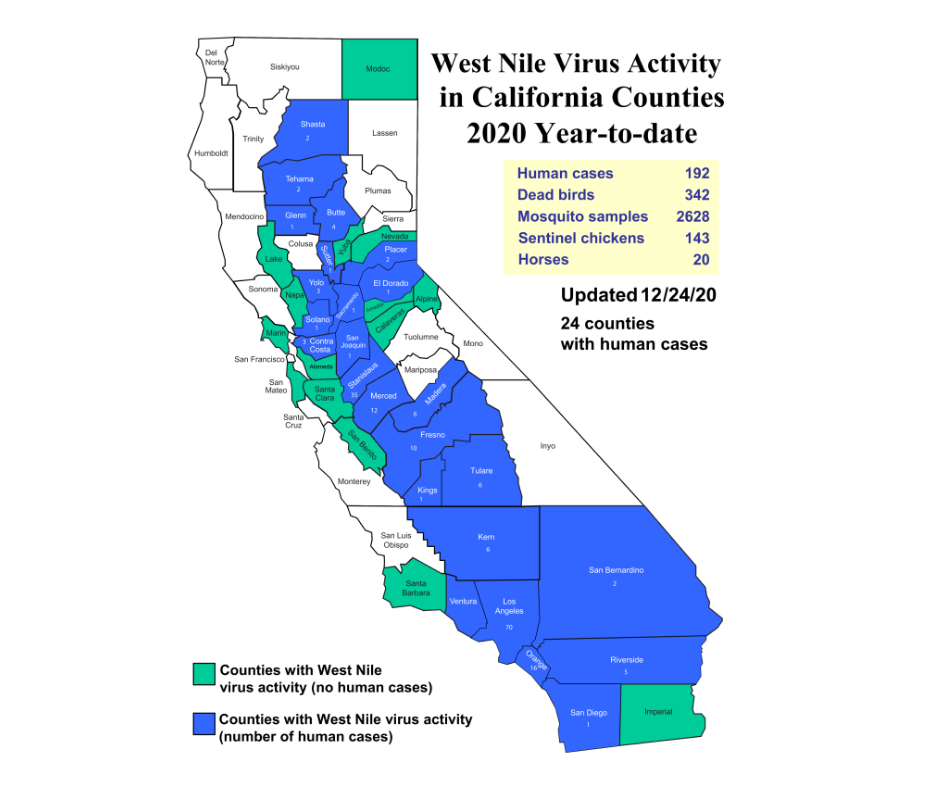Fall Newsletter 2021
Fall 2021
Quarterly Newsletter and Updates
.png?ixlib=rb-1.1.0&w=2000&h=2000&fit=max&or=0&s=d98033cff0edb1327dc28a876c86bfdc)
Mosquitoes and Drought
In the mosquito abatement world an increase in rain typically leads to an increase in mosquitoes. Conversely, does a decrease in rain mean a decrease in mosquitoes? Not necessarily…
The entire West Coast has seen a significant decrease of rain over the past two decades, which has led to multiple yearlong droughts. While rain is a significant component in mosquito abundance, it is not the only factor supporting mosquito habitats. During a drought the weather is usually warmer, which may help mosquitoes thrive and shorten their overwintering periods. Another contributor can be loss of natural predators. Even if a creek or pond has too little water to support fish, it may have enough water to allow mosquitoes to grow. Some mosquitoes larvae can survive in just a few milliliters of water. Mosquitoes can also proliferate when stormwater drains are stalled with little water flow and too much debris. According to one study, females may bite more often during drought years because they are using blood not just to nourish eggs, but also to stay hydrated.
Drought years may also lead to an increase in mosquito borne diseases such as West Nile virus, because with fewer water sources, birds and mosquitoes will often congregate in the same areas, which can lead to more mosquito bites on birds and more opportunities for West Nile virus transmission between the species.
If you find small pockets of water that are breeding, or notice mosquitoes flying from stormdrains or other areas, contact us so we can treat it appropriately.
Alameda County Cemeteries
.png?ixlib=rb-1.1.0&w=2000&h=2000&fit=max&or=0&s=c1964c1d63dc4098dc9b47ec93ec117b)
Our district prioritizes preventative action, a key part of our Integrated Mosquito Management program, to ensure invasive Aedes mosquitoes do not establish in Alameda County.
Invasive Aedes are aggressive day biting mosquitoes which lay their eggs on the sides of containers. The species we are most concerned about Aedes aegypti can transmit various viruses including Zika, dengue fever, chikungunya , and this specific species has been found in many parts of California, including nearby San Joaquin, Stanislaus and Sacramento counties. By learning from other California mosquito control districts and researching recent trends, we know cemeteries are a likely primary location for invasive Aedes to establish. Cemeteries offer an environment uniquely suited for invasive Aedes mosquitoes, owing to the large number of containers such as flower vases and a consistent water supply due to irrigation. Added to that, cemeteries offer shade for adult mosquitoes to rest, along with ample supplies of birds and humans for blood meals. Cemeteries throughout California are sources of mosquitoes, including the species that can carry West Nile virus, which entered Alameda County in 2004 and quickly established in the native mosquito population. Learning from the history of West Nile virus and with an eye to the future, we chose to take aggressive preventative action before a new mosquito species with greater disease potential establishes itself here.
We are now working with all the cemeteries in Alameda County to take preventative action against invasive Aedes. Cemeteries can choose which mitigation tactics will work best for their location and community based on the list of possible solutions each cemetery received. Options include filling vases with sand, cement, water storing crystals, or a removable plastic vase that is drained weekly. We are not asking the cemeteries to modify their routine irrigation or cleaning activities. We feel it is important for cemetery leadership to decide which mitigation actions to take, as they understand which practices will be sustainable for their staff and are culturally appropriate to their own communities. We appreciate the cemeteries for working with us to prevent invasive Aedes infestation in Alameda County.
Appreciation: Betsy Cooley retired from her position at the Board Trustee for the City of Emeryville. We appreciate Betsy’s diligence and thoughtful insight she brought to the Board of Trustees, and we are grateful to her dedication over the years. We are currently in the process of recruiting a new trustee for Emeryville.
Social media moment
.png?ixlib=rb-1.1.0&w=2000&h=2000&fit=max&or=0&s=bde4872293ffce557b0d005b3b943261)
West Nile Virus Update

Our laboratory continues to test suitable dead birds for West Nile virus (WNV). So far this year we have tested 78 dead birds and two came back positive, one on September 27, 2021 in Pleasanton and the second on September 30th, 2021 in Livermore.
If you come across a dead bird please report it online at www.westnile.ca.gov. The mosquitoes most effective at spreading WNV are common in the fall months. Remember, mosquitoes can breed all year long in the Bay Area so preventative activities such as removing standing water, adding mosquito fish to ponds, troughs, and neglected swimming pools reduce our risk of West Nile virus. Now is a great time to check for standing water in your yard and drain or cover anything that will hold water longer than 4 days. Visit our backyard checklist to see common places where mosquitoes produce.
Outreach announcement: We are attending festivals and outdoor events again. If your organization wants a presentation or a table at an event, contact us at 510-783-7744 or contact Judith Pierce, Public Outreach Coordinator at judith@mosquitoes.org
